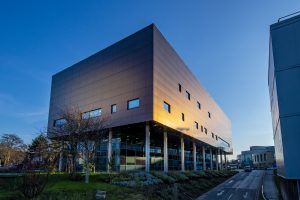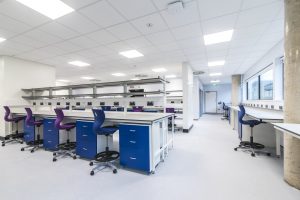Anne Rogel is a Senior postdoctoral researcher and has been working in the Antibody and Vaccine Group since 2012.
Her research mainly focuses on CD8+ T cells, which are a subset of white blood cells that have the potential to recognise and kill tumour cells and can be harnessed to create better treatments for cancer.
Here, she explains more about her research and why she wanted to work at the Centre for Cancer Immunology.
Tell us about your current research focus?
I work mainly with Prof. Aymen Al-Shamkhani, in the Antibody and Vaccine Group, and focus on CD8+ T cells, which are a subset of white blood cells that have the potential to recognise and kill tumour cells.
However, tumour cells develop ways to avoid destruction by CD8+ T cells, allowing cancers to develop and grow. Interestingly, CD8+ T cells come in many flavours. For example, some called “effectors” have an immediate ability to kill but don’t survive for a very long time. In contrast, another category of CD8+ T cells, called “memory CD8+ T cells”, can survive for years in the body, thereby providing long-lasting protection against tumour cells. In fact, these effector cells and memory cells can be further divided in more subsets according to different characteristics.
We need to understand what all these subsets of CD8+ T cells can and cannot do and assess how we can modulate their characteristics. Some of my projects have been funded by CRUK, others by industrial partners.
Gaining a better understanding of the mechanisms that regulate the function of these subsets of CD8+ T cells involves studying the role of molecules at their surface but also inside them.
What are you working on at the moment?
I work on identifying new targets and developing new immunomodulatory drugs that can unleash the ability of CD8+ T cells to kill tumour cells. For example, we have recently developed new agonistic antibodies binding to a target expressed at the surface of CD8+ T cells. Using a range of in vitro assays, we have shown that these antibodies can enhance the activation and effector function of CD8+ T cells isolated from blood from healthy donors, but also from tumour biopsies from Head and Neck Squamous Cell Carcinoma patients, highlighting their potential as new cancer immunotherapy drugs.

What impact could your research have on cancer patients?
Although current immunotherapy drugs (checkpoint blockers) have shown unprecedented results in the clinic, only a fraction of cancer patients respond to the most effective ones currently available. It is critical to develop new immunotherapy drugs, and more effective combination of drugs, in order to improve clinical outcomes for more patients.
Why did you decide to focus on that particular area of research?
As a student, I developed a particular interest in immunology and decided to do a Master of Sciences and then a PhD in that field. The research labs where I worked at that time were developing cancer immunotherapy strategies and I found these innovative therapeutic approaches really fascinating and promising. This was actually before cancer immunotherapy was named “breakthrough of the year” by Science magazine in 2013. Since then, I have always worked in the field of cancer immunotherapy.
By gaining an in-depth understanding of how the function of CD8+ T cells is regulated, we could design more effective drugs to harness CD8+ T cells to target tumours.
Why did you decide to work at Southampton?
I am French and studied in France at the University of Nantes. I obtained my PhD in Immunology there and worked as a lecturer for one year. During that time, I worked in several teams in a research centre dedicated to cancer research, with a strong focus in immunotherapy.
I wanted to work as a postdoctoral researcher in academia and wanted to keep focusing on cancer immunology. I also wanted work experience abroad.. The research led by Prof. Al-Shamkhani, and more broadly by the Antibody and Vaccine Group, met my scientific interests and I knew I would have the opportunity to work on new experimental models to extend my expertise. I was also attracted by the particularly collaborative environment of the Antibody and Vaccine Group, and the possibility to work in collaboration with clinicians, making it possible to develop translational research.

What excites you most about the future of your research field?
Tumours comprise numerous types of cells, including cancer cells and many subsets of immune cells, and interactions between these different cell types are particularly complex. Analysing what each individual cell is doing has been made possible by recent technology advances – these single-cell analysis methods are very exciting tools to gain a better understanding of the behaviour of different cells and of how they interact with each other.
This type of technology allows an unprecedented comprehensive analysis of cancer microenvironment and will certainly allow researchers to design new, more effective immunotherapy treatments for cancer patients.